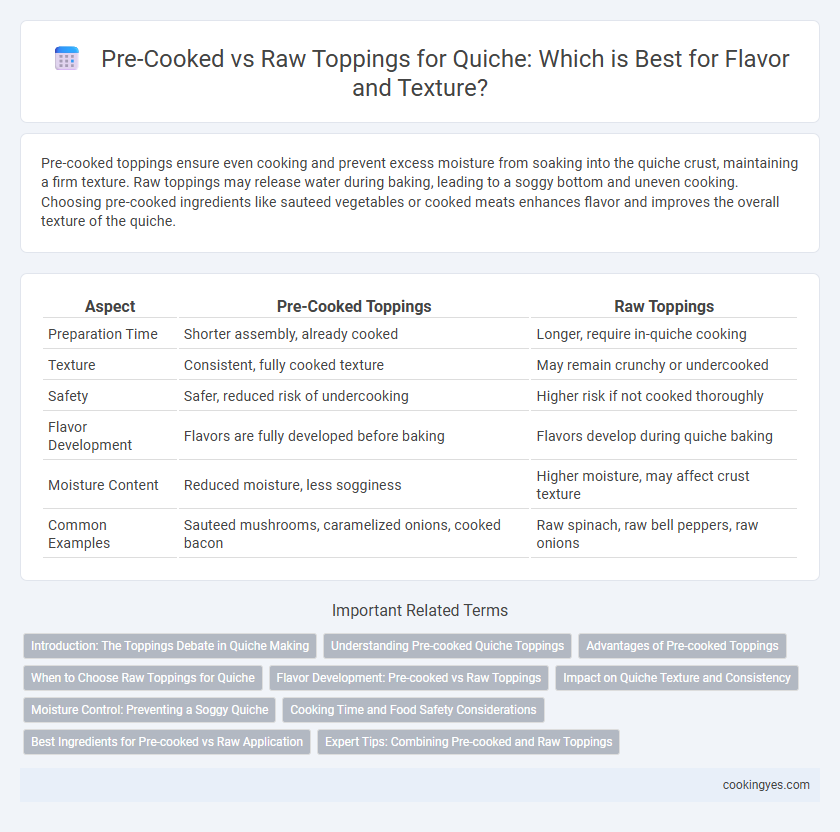Pre-cooked toppings ensure even cooking and prevent excess moisture from soaking into the quiche crust, maintaining a firm texture. Raw toppings may release water during baking, leading to a soggy bottom and uneven cooking. Choosing pre-cooked ingredients like sauteed vegetables or cooked meats enhances flavor and improves the overall texture of the quiche.
Table of Comparison
| Aspect | Pre-Cooked Toppings | Raw Toppings |
|---|---|---|
| Preparation Time | Shorter assembly, already cooked | Longer, require in-quiche cooking |
| Texture | Consistent, fully cooked texture | May remain crunchy or undercooked |
| Safety | Safer, reduced risk of undercooking | Higher risk if not cooked thoroughly |
| Flavor Development | Flavors are fully developed before baking | Flavors develop during quiche baking |
| Moisture Content | Reduced moisture, less sogginess | Higher moisture, may affect crust texture |
| Common Examples | Sauteed mushrooms, caramelized onions, cooked bacon | Raw spinach, raw bell peppers, raw onions |
Introduction: The Toppings Debate in Quiche Making
Pre-cooked toppings for quiche, such as sauteed vegetables or cooked bacon, enhance flavor depth and prevent excess moisture from compromising the crust's texture. Raw toppings, including fresh herbs or raw vegetables, offer a vibrant taste and crispness but may release water during baking, risking a soggy base. Choosing between pre-cooked and raw ingredients significantly impacts the quiche's structural integrity and overall taste balance.
Understanding Pre-cooked Quiche Toppings
Pre-cooked quiche toppings, such as sauteed vegetables, cooked bacon, or caramelized onions, enhance flavor development by releasing moisture and intensifying taste before baking. Using pre-cooked toppings prevents sogginess in the quiche crust, maintaining a crisp texture and evenly cooked filling. Raw toppings tend to release excess liquid during baking, which can result in a watery filling and uneven cooking.
Advantages of Pre-cooked Toppings
Pre-cooked toppings for quiche assembly ensure even cooking and prevent soggy crusts by reducing excess moisture during baking. They enhance flavor development through caramelization and allow for better texture control, resulting in a more balanced and savory final dish. Using pre-cooked ingredients also streamlines the assembly process, minimizing preparation time and ensuring consistent results.
When to Choose Raw Toppings for Quiche
Choosing raw toppings for quiche assembly is ideal when using vegetables with high moisture content like spinach, mushrooms, or bell peppers, as they release liquid during baking and cook thoroughly within the quiche. Raw meats, such as bacon or ham, should be precooked to ensure safe consumption and prevent sogginess. Selecting raw toppings reduces preparation time and preserves the fresh texture and flavor, especially for delicate ingredients that soften well during the baking process.
Flavor Development: Pre-cooked vs Raw Toppings
Pre-cooked toppings enhance quiche flavor development by caramelizing sugars and intensifying aromas, resulting in a richer, deeper taste profile. Raw toppings release more moisture during baking, which can dilute flavors and affect the quiche's texture. Using pre-cooked ingredients ensures better Maillard reactions and a concentrated, savory outcome.
Impact on Quiche Texture and Consistency
Pre-cooked toppings in quiche, such as sauteed vegetables or pre-cooked meats, release less moisture during baking, resulting in a firmer and more consistent texture with a well-defined filling. Raw toppings, like fresh vegetables or raw bacon, tend to release water and require longer baking times, often causing a softer, sometimes soggy crust and a less cohesive consistency. Choosing pre-cooked toppings ensures better control over the quiche's texture by minimizing excess moisture and achieving even cooking throughout.
Moisture Control: Preventing a Soggy Quiche
Pre-cooked toppings like sauteed vegetables and browned meats release less moisture during baking, helping maintain a crisp quiche crust. Raw toppings often contain higher water content, which can lead to soggy quiche unless properly drained or pre-cooked. Effective moisture control through pre-cooking ensures a balanced texture and prevents the filling from becoming watery.
Cooking Time and Food Safety Considerations
Pre-cooked toppings reduce quiche assembly cooking time by ensuring ingredients are fully cooked prior to baking, minimizing the risk of undercooked fillings. Raw toppings require longer baking times to achieve safe internal temperatures, increasing the importance of careful temperature monitoring to prevent foodborne illnesses. Proper handling of both types is essential to maintain food safety standards and achieve optimal quiche texture and flavor.
Best Ingredients for Pre-cooked vs Raw Application
Pre-cooked toppings such as sauteed mushrooms, caramelized onions, and cooked bacon enhance quiche by reducing moisture and intensifying flavors, preventing sogginess in the crust. Raw toppings like fresh spinach, sliced tomatoes, or herbs provide a vibrant texture and fresh taste but require careful moisture management to avoid watery filling. Choosing ingredients based on their moisture content and cooking properties ensures an ideal balance of texture and flavor in quiche assembly.
Expert Tips: Combining Pre-cooked and Raw Toppings
Expert tips for quiche assembly recommend combining pre-cooked toppings like sauteed mushrooms, caramelized onions, or roasted vegetables with raw ingredients such as fresh spinach or sliced tomatoes to balance texture and flavor. Pre-cooked toppings reduce moisture release and ensure even cooking, preventing soggy crusts, while raw toppings retain vibrant freshness and nutritional value. This blend enhances the quiche's taste profile and promotes a perfectly set filling with a crisp, golden crust.
Pre-cooked toppings vs Raw toppings for quiche assembly Infographic

 cookingyes.com
cookingyes.com